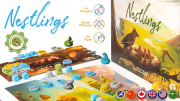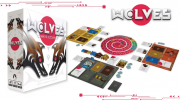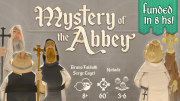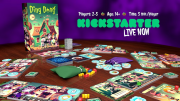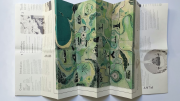Nestlings (Tangerine Games) – Each player takes on the role of a bird species competing for four different biomes. Each biome has its own unique collection of resources in it each round. Players roll their dice at the start of the round, choosing which, if any, they wish to re-roll. Then players take turns one at a time, placing dice into the biomes that match those dice’s results. Players continue placing dice until everyone has placed all their dice or passed (you may choose to save one of your dice for the next round). The player who placed a die in a biome first has priority there that round, unless another player has more dice present at that biome. The player with priority gets to choose a resource first. Players can bring resources from their species' native biome to their nests, earning points immediately, or save resources to score end-game goals. Players also earn points and bonuses by collecting unique resources they have not yet gathered.
Casual Game Crowdfunding: Birds, Bees, and Wolves

From bees making honey and birds gathering resources, this month’s Kickstarters also offer a murder mystery in an abbey, players trying to carry their tribes through the winter together while vying for prestige, a Halloween card game of chasing off trick-or-treaters, an abstract strategy game, and a light RPG.
Honey Hop (Undeferred Interactive) – On your turn, you take three actions, choosing from a selection of four. You can move one of your bees in a straight line until it reaches an obstacle — since only one bee can be on a field location at a time, you can use this action to bump other bees off a tile you wish to land on. If your bee lands on a tile with a rain token, it is stuck there and can take no further actions until the rain either moves or the bee is bumped out of the rain. Another action is to collect nectar either from a flower tile or another player's hive. Each bee can only carry two pieces of nectar at a time. You can make honey by turning nectar that has been brought to your hive into honey. Honey is worth more points the more different types of nectar were used to make it. You can also use an action to collect a card. Cards are played for special abilities.
Wolves (Coyote & Crow Games) – A semi-cooperative game that takes place over eight turns and that starts in spring and ends in winter. Each player chooses a community to play, each with its own strengths and weaknesses. Each turn, players will draw cards from their decks, choosing when to stop drawing, as there are consequences for overstretching yourself. You must spend your resources to help your community, but you can also gift resources to other players or store them for future turns. Gifting resources will earn you status, and players are vying for status to win the game. You can turn down a gift if you don’t want to gift a specific player status points. Resources become scarcer the closer you get to the winter, but if all players don't survive the winter, then no one wins the game.
Mystery of the Abbey (Mojito Studios) – There has been a murder in the abbey, and you are trying to figure out which of 24 monk cards in the game is the guilty party. Each player will have a hand of suspect cards: the ones in your hand are the ones you know are innocent. Each card will list different characteristics for each monk. You can use these characteristics to question other players to try to deduce what cards are in their hands. On your turn, you move your monk two spaces in the abbey. If you end in a room with another player, you may ask him one question. If that player chooses to answer, they ask you one question in return, which you must also answer. All answers must be truthful, and while you may ask any kind of question, they must be phrased in a way that allows the answerer to respond without giving a name. You then resolve the action of the room you are in. There are a number of room actions such as taking a card from another player or drawing another suspect card.
Yama (Khanat Sadomwattana) – In this two-player abstract strategy game, you play on a spinning, triangular turntable. Each turn, you place a cube on the board. The cubes are placed slotted into a space so that you will only see three of its sides as you rotate the board. Two of the sides will show one color, and the third side will show the other color in the game. The goal is to create four in a line of your color, and that line can be in any of the three perspectives from rotating the turntable. As more cubes fill up the board, you can also stack a cube on top of three other cubes.
Ding Dong (The GamerSpark) – Every round, a kid card is drawn to represent a child coming to prank you on Halloween. You can either scare them away with decorations and earn points, play cards for their special abilities, or spend candy to make them go prank another player. Players are trying to complete sets by scaring children in different costumes. Each player also has a unique role that comes with its own strengths and weaknesses.
Border Ridings (Stout Stoat) – All you need to play this light RPG is at least three players, paper, pens, and two regular dice. It is a cooperative, history-building, map-drawing game. This roleplaying game does not require a dungeon master. You are telling the history of a community, drawing maps together as it evolves and changes over the course of many in-game years. Multiple in-game years pass each round, and each round a different player leads the game, introducing an event that affects the community. Players draw a new map to reflect how the community changes from these events. At the end of the game, you jump another 500 years into the future and then see which, if any, of the original landmarks and decisions of the community had an effect on the future, comparing the maps you drew across all the rounds. The rules themselves are printed on a foldout map.
Disclosure: unless otherwise noted, we have not seen or played any of the above games. Our assessment of each is based on the information given on the crowdfunding project page.




